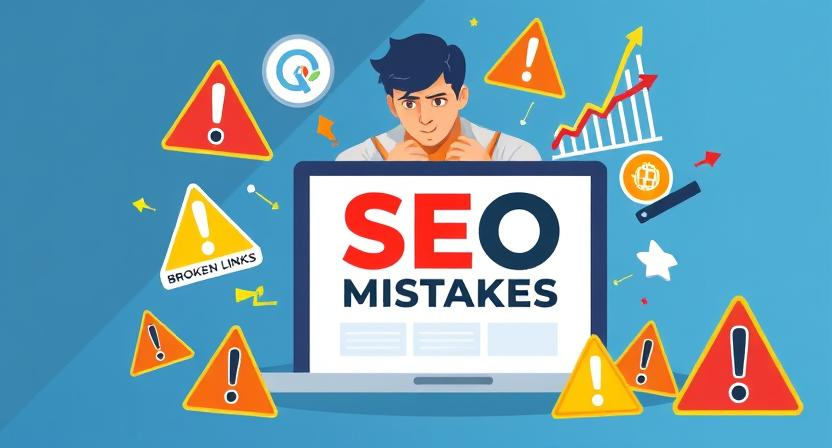Online presence depends critically on your website ranking highly on search engines. Still, many companies find that preventable errors affect SEO. These mistakes most certainly explain why your site isn’t showing on Google’s first page. This article will discuss common SEO mistakes that compromise rankings and how to correct them. Avoiding these mistakes can help your website run better whether you are a novice or an expert webmaster. Using expert SEO support, like that provided by search services organizations, is one excellent approach to maximizing your efforts.
Let’s discuss the basic SEO mistakes:
-
Ignoring Research on Keywords
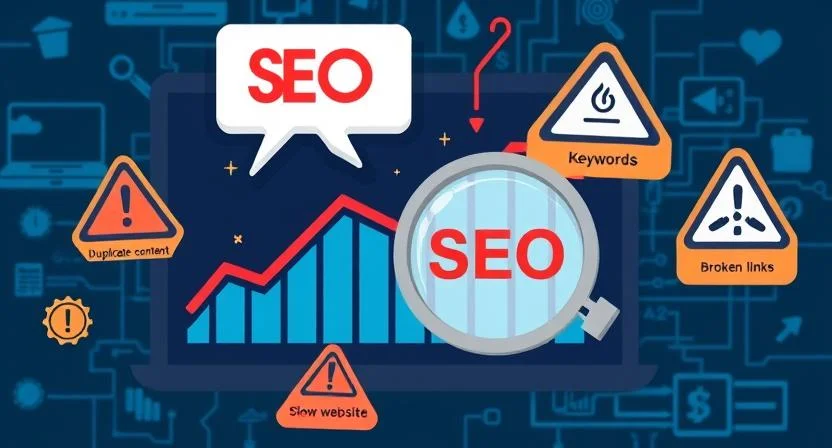
Ignoring keyword research is among the worst SEO mistakes one can commit. Many companies believe they know what their audience is looking for, but without enough research, they frequently target the incorrect keywords. Good keyword research guarantees you maximize your material for phrases your readers use. Search appropriate keywords with reasonable search volume and competition levels using tools like Google Keyword Planner, Ahrefs, or SEMrush.
-
With the incorrect keywords
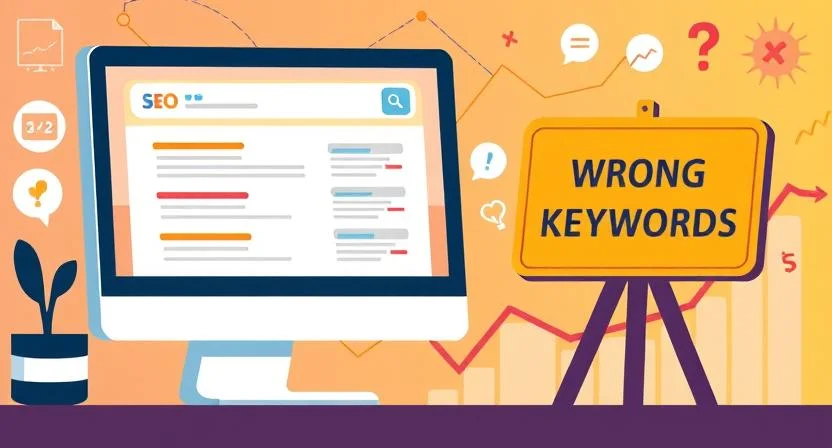
Using the wrong keywords could lower your results even if you do keyword research. It is a mistake to target just highly competitive keywords without thinking through long-tail keywords. Usually with reduced competition and better conversion rates, long-tail keywords have. Furthermore, steer clear of keyword stuffing—overloading your material with keywords—which might result in Google fines.
-
Poor Quality Content
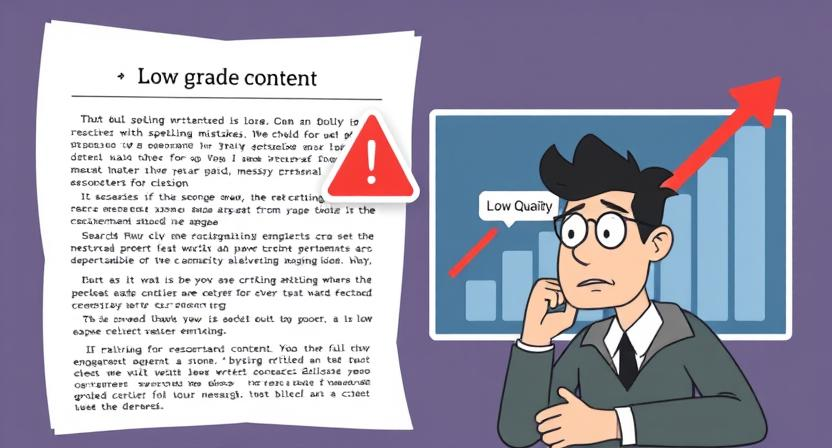
In SEO, content rules, but only if it’s relevant and worthwhile. Many websites provide low-quality, duplicate, or shallow content—which search engines devalue. To rank higher, produce innovative, well-researched, interesting material that actually benefits consumers. Make sure your material is routinely updated and satisfactorily addresses user questions.
-
Not Optimizing Title Tags and Meta Descriptions
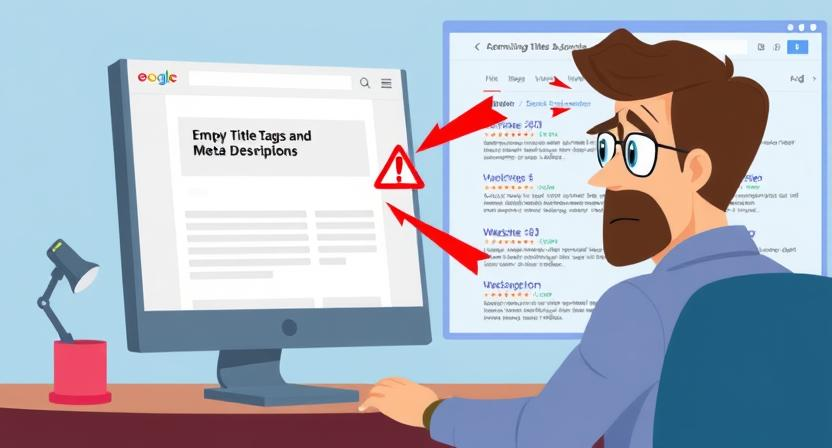
While many website owners overlook title tags and meta descriptions, they are absolutely vital in SEO. These components provide search engines and users of your material a glimpse. Make sure your title tags are interesting, keyword-rich, and brief. Create interesting meta descriptions as well that inspire readers to click through.
-
Ignoring Image Optimization

Although images enhance user experience, if not properly optimized, they might slow down your website. Large, uncompressed photos raise load times, thereby influencing ranks negatively. Make sure you provide descriptive alt language to enable search engines to recognize your photos and use TinyPNG and other image reduction tools.
-
Slow Website Speed
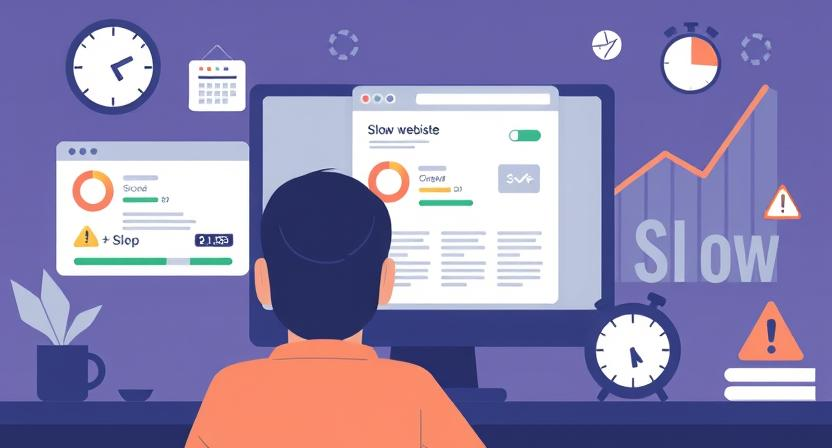
One ranking criterion is page speed; a sluggish website could result in worse user experience and more bounced visits. Google PageSpeed Insights lets you test the speed of your website. Compress pictures, use browser caching, and cut JavaScript and CSS file count to maximize loading times.
-
Not Having a Mobile-Friendly Website
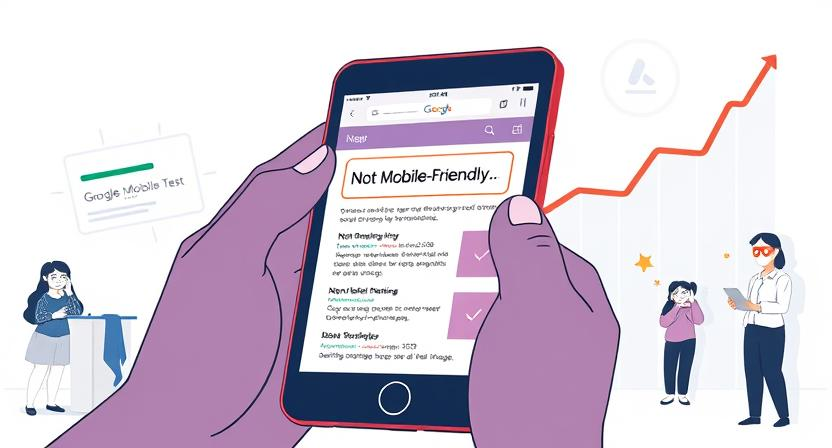
Google gives mobile-friendly websites top attention with mobile-first indexing. Your site is losing possible ranking if it is not responsive. Using responsive design, enhance navigation, and test your website on several devices can help to guarantee its mobile-optimized nature.
-
Poor Internal Linking Structure

Internal linking clarifies for search engines your website’s architecture. Many site managers either abuse internal linking in an unnatural manner or ignore it entirely. Correctly connecting pertinent pages increases SEO, link equity, and navigation.
Let’s discuss the complex SEO mistakes:
-
Insufficient Backlinks or Low-Quality Linking
Though many companies either ignore link-building or utilize poor-quality backlinks, links are a crucial ranking consideration. Google penalties might result from spammy, useless backlinks. Rather, use guest blogging, outreach, and content marketing to target excellent, relevant backlinks from reputable sites.
-
Discounting Technical SEO are SEO Mistakes
Search engine crawlers need technical SEO if they are to correctly index your site. Your rankings may be hampered by broken links, duplicate content, missing XML sitemaps, and incorrect redirecting. Using tools like Google Search Console or Screaming Frog, routinely audit your site to find and correct technical SEO mistakes.
-
Not Applying Schema Markup are SEO Mistakes
Rich snippets can improve search results and aid search engines in better understanding your material thanks to schema markup. Many websites neglect schema, thereby depriving better visibility. Mark up your reviews, goods, FAQs, and other pertinent information using structured data.
-
Ignoring User Experience ( UX) are SEO Mistakes
When ranking websites, search engines assess user experience. Bad UX—that is, challenging navigation, obtrusive pop-ups, or messy layouts—may raise bounce rates. Emphasize building a user-friendly website that invites users to connect with your material and remain longer.
-
Not Changing Previous Material are SEO Mistakes
SEO is not only about producing fresh material; as vital is updating previously published material. Older posts may lose ranking over time if they have broken links or obsolete material. Update and improve aging material often to keep it current and preserve rankings.
-
Inadequate Integration of Social Media
Social media increases traffic and interaction even if it has no direct effect on SEO. Many companies neglect to use social media channels to highlight material and raise brand recognition. Indirectly improving your SEO efforts is by sharing quality material on sites like Twitter, LinkedIn, and Facebook.
-
Bad URL Construction are SEO Mistakes
URLs should be neat, clear, and search engine optimized. Steer clear of utilizing random characters or long, difficult URLs, including numerals. Rather, design straightforward, easily navigable, keyword-rich URLs that make sense.
-
Not Employing Google My Business for Local SEO
Google My Business (GMB) is a great tool for small enterprises. Ignoring maximizing your GMB profile can cause you to show nowhere on local searches. Make sure your GMB profile has proper information, company hours, and full customer reviews.
-
Ignoring SEO Tracking and Analytics are SEO Mistakes
SEO is a continual activity needing regular observation. Many proprietors of websites neglect to monitor their performance, which makes problem identification and fixing challenging. Track traffic, rankings, and user activity with tools such as Google Analytics and Google Search Console. Frequent examination enables your SEO strategy to be more polished.
-
Ignoring HTPS, security
Google gives safe websites top priority, and employing HTTPS ranks. Should your website still run HTTP, your user confidence and rankings may suffer. To guarantee a safe surfing experience, make sure your website carries an SSL certificate.
Conclusion
Reducing these typical SEO mistakes can help your website rank much better and show more online presence. SEO is a continuous process needing consistent updates and strategic improvement. You may improve the performance of your website by concentrating on top-notch content, technological tweaks, and user interface. If you want professional advice, think about consulting SEO-oriented experts. Correct these errors, and you’ll be headed toward improved search results and more natural visitors.
You can also check:
Search Engine Optimization (SEO) Starter Guide by Google
Or for AI Marketing Tools Check:

